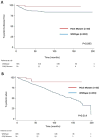Polymerase ɛ (POLE) mutations in endometrial cancer: clinical outcomes and implications for Lynch syndrome testing
- PMID: 25224212
- PMCID: PMC4304930
- DOI: 10.1002/cncr.29046
Polymerase ɛ (POLE) mutations in endometrial cancer: clinical outcomes and implications for Lynch syndrome testing
Abstract
Background: DNA polymerase ɛ (POLE) exonuclease domain mutations characterize a subtype of endometrial cancer (EC) with a markedly increased somatic mutational burden. POLE-mutant tumors were described as a molecular subtype with improved progression-free survival by The Cancer Genome Atlas. In this study, the frequency, spectrum, prognostic significance, and potential clinical application of POLE mutations were investigated in patients with endometrioid EC.
Methods: Polymerase chain reaction amplification and Sanger sequencing were used to test for POLE mutations in 544 tumors. Correlations between demographic, survival, clinicopathologic, and molecular features were investigated. Statistical tests were 2-sided.
Results: Thirty POLE mutations (5.6%) were identified. Mutations were associated with younger age (<60 years; P=.001). POLE mutations were detected in tumors with microsatellite stability (MSS) and microsatellite instability (MSI) at similar frequencies (5.9% and 5.2%, respectively) and were most common in tumors with MSI that lacked mutL homolog 1 (MLH1) methylation (P<.001). There was no association with progression-free survival (hazard ratio, 0.22; P=.127).
Conclusions: The discovery that mutations occur with equal frequency in MSS and MSI tumors and are most frequent in MSI tumors lacking MLH1 methylation has implications for Lynch syndrome screening and mutation testing. The current results indicate that POLE mutations are associated with somatic mutation in DNA mismatch repair genes in a subset of tumors. The absence of an association between POLE mutation and progression-free survival indicates that POLE mutation status is unlikely to be a clinically useful prognostic marker. However, POLE testing in MSI ECs could serve as a marker of somatic disease origin. Therefore, POLE tumor testing may be a valuable exclusionary criterion for Lynch syndrome gene testing.
Keywords: DNA mismatch repair; Lynch syndrome; endometrial cancer; mutation.
© 2014 American Cancer Society.
Figures



Comment in
-
POLE mutations as an alternative pathway for microsatellite instability in endometrial cancer: implications for Lynch syndrome testing.Cancer. 2015 Feb 1;121(3):331-4. doi: 10.1002/cncr.29057. Epub 2014 Sep 15. Cancer. 2015. PMID: 25224324 No abstract available.
Similar articles
-
Interpretation of somatic POLE mutations in endometrial carcinoma.J Pathol. 2020 Mar;250(3):323-335. doi: 10.1002/path.5372. Epub 2020 Jan 29. J Pathol. 2020. PMID: 31829442 Free PMC article.
-
POLE exonuclease domain mutation predicts long progression-free survival in grade 3 endometrioid carcinoma of the endometrium.Gynecol Oncol. 2014 Jul;134(1):15-9. doi: 10.1016/j.ygyno.2014.05.006. Epub 2014 May 16. Gynecol Oncol. 2014. PMID: 24844595
-
An NRG Oncology/GOG study of molecular classification for risk prediction in endometrioid endometrial cancer.Gynecol Oncol. 2018 Jan;148(1):174-180. doi: 10.1016/j.ygyno.2017.10.037. Epub 2017 Nov 11. Gynecol Oncol. 2018. PMID: 29132872 Free PMC article.
-
Universal endometrial cancer tumor typing: How much has immunohistochemistry, microsatellite instability, and MLH1 methylation improved the diagnosis of Lynch syndrome across the population?Cancer. 2019 Sep 15;125(18):3172-3183. doi: 10.1002/cncr.32203. Epub 2019 May 31. Cancer. 2019. PMID: 31150123 Review.
-
Microsatellite instability: an update.Arch Toxicol. 2015 Jun;89(6):899-921. doi: 10.1007/s00204-015-1474-0. Epub 2015 Feb 22. Arch Toxicol. 2015. PMID: 25701956 Review.
Cited by
-
Characterization of hotspot exonuclease domain mutations in the DNA polymerase ϵ gene in endometrial cancer.Front Oncol. 2022 Oct 12;12:1018034. doi: 10.3389/fonc.2022.1018034. eCollection 2022. Front Oncol. 2022. PMID: 36313640 Free PMC article.
-
In Silico Identification of Hub Genes as Observing Biomarkers for Gastric Cancer Metastasis.Evid Based Complement Alternat Med. 2022 Apr 30;2022:6316158. doi: 10.1155/2022/6316158. eCollection 2022. Evid Based Complement Alternat Med. 2022. Retraction in: Evid Based Complement Alternat Med. 2023 Aug 9;2023:9780939. doi: 10.1155/2023/9780939 PMID: 35535159 Free PMC article. Retracted.
-
Interpretation of somatic POLE mutations in endometrial carcinoma.J Pathol. 2020 Mar;250(3):323-335. doi: 10.1002/path.5372. Epub 2020 Jan 29. J Pathol. 2020. PMID: 31829442 Free PMC article.
-
Functional Analysis of Cancer-Associated DNA Polymerase ε Variants in Saccharomyces cerevisiae.G3 (Bethesda). 2018 Mar 2;8(3):1019-1029. doi: 10.1534/g3.118.200042. G3 (Bethesda). 2018. PMID: 29352080 Free PMC article.
-
Histopathological features of endometrial carcinomas associated with POLE mutations: implications for decisions about adjuvant therapy.Histopathology. 2016 May;68(6):916-24. doi: 10.1111/his.12878. Epub 2015 Dec 17. Histopathology. 2016. PMID: 26416160 Free PMC article.
References
Publication types
MeSH terms
Substances
Grants and funding
LinkOut - more resources
Full Text Sources
Other Literature Sources

